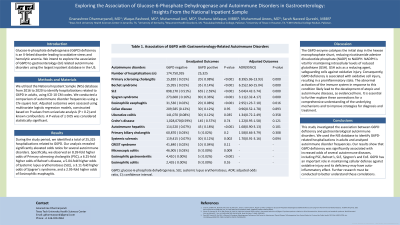Tuesday Poster Session
Category: Practice Management
P4063 - Exploring the Association of Glucose-6-Phosphate Dehydrogenase and Autoimmune Disorders in Gastroenterology: Insights From the National Inpatient Sample
Tuesday, October 24, 2023
10:30 AM - 4:00 PM PT
Location: Exhibit Hall

Has Audio

Gnanashree Dharmarpandi, MD
Texas Tech University Health Sciences Center
Amarillo, TX
Presenting Author(s)
Gnanashree Dharmarpandi, MD1, Waqas Rasheed, MD1, Shahana ishfaque, MBBS2, Muhammad Anil, MD3, Muhammad Anees, MD1, Sarah Naveed. Qureshi, MBBS4
1Texas Tech University Health Sciences Center, Amarillo, TX; 2Punjab Medical College, Faisalabad, Pakistan, Dearborn, MI; 3Beaumont Hospital, Dearborn, MI; 4CMH Multan Institute of Medical Sciences, Multan, Pakistan, Beaumont, TX
Introduction: Glucose-6-phosphate dehydrogenase (G6PD) deficiency is an X-linked disorder leading to oxidative stress and hemolytic anemia. We intend to explore the association of G6PD to gastroenterology (GI) related autoimmune disorders using the largest inpatient database in the US.
Methods: We utilized the National Inpatient Sample (NIS) database from 2016 to 2020 to identify hospitalizations related to G6PD in adults, using ICD-10 CM codes. We conducted a comparison of autoimmune disorder frequencies using a Chi-square test. Adjusted outcomes were assessed using multivariate logistic regression models, constructed based on P-values from univariate analysis (P < 0.2) and known confounders. A P-value of ≤ 0.05 was considered statistically significant.
Results: During the study period, we identified a total of 25,325 hospitalizations related to G6PD. Our analysis revealed significantly elevated odds ratios for several autoimmune disorders. Specifically, we observed an 8.39-fold higher odds of Primary sclerosing cholangitis (PSC), a 6.25-fold higher odds of Behcet's disease, a 5.04-fold higher odds of Systemic lupus erythematosus (SLE), a 3.11-fold higher odds of Sjogren's syndrome, and a 2.95-fold higher odds of Eosinophilic esophagitis.
Discussion: The G6PD enzyme catalyzes the initial step in the hexose monophosphate shunt, reducing nicotinamide adenine dinucleotide phosphate (NADP) to NADPH. NADPH is vital for maintaining intracellular levels of reduced glutathione (GSH). GSH acts as a reducing agent, safeguarding cells against oxidative injury. Consequently, G6PD deficiency is associated with oxidative cell injury, resulting in a proinflammatory state. The abnormal activation of the immune system in response to this condition likely lead to the development of atopic and autoimmune diseases, as evidenced here. It is essential to further explore these connections for a comprehensive understanding of the underlying mechanisms and to improve strategies for diagnosis and treatment.
Disclosures:
Gnanashree Dharmarpandi, MD1, Waqas Rasheed, MD1, Shahana ishfaque, MBBS2, Muhammad Anil, MD3, Muhammad Anees, MD1, Sarah Naveed. Qureshi, MBBS4. P4063 - Exploring the Association of Glucose-6-Phosphate Dehydrogenase and Autoimmune Disorders in Gastroenterology: Insights From the National Inpatient Sample, ACG 2023 Annual Scientific Meeting Abstracts. Vancouver, BC, Canada: American College of Gastroenterology.
1Texas Tech University Health Sciences Center, Amarillo, TX; 2Punjab Medical College, Faisalabad, Pakistan, Dearborn, MI; 3Beaumont Hospital, Dearborn, MI; 4CMH Multan Institute of Medical Sciences, Multan, Pakistan, Beaumont, TX
Introduction: Glucose-6-phosphate dehydrogenase (G6PD) deficiency is an X-linked disorder leading to oxidative stress and hemolytic anemia. We intend to explore the association of G6PD to gastroenterology (GI) related autoimmune disorders using the largest inpatient database in the US.
Methods: We utilized the National Inpatient Sample (NIS) database from 2016 to 2020 to identify hospitalizations related to G6PD in adults, using ICD-10 CM codes. We conducted a comparison of autoimmune disorder frequencies using a Chi-square test. Adjusted outcomes were assessed using multivariate logistic regression models, constructed based on P-values from univariate analysis (P < 0.2) and known confounders. A P-value of ≤ 0.05 was considered statistically significant.
Results: During the study period, we identified a total of 25,325 hospitalizations related to G6PD. Our analysis revealed significantly elevated odds ratios for several autoimmune disorders. Specifically, we observed an 8.39-fold higher odds of Primary sclerosing cholangitis (PSC), a 6.25-fold higher odds of Behcet's disease, a 5.04-fold higher odds of Systemic lupus erythematosus (SLE), a 3.11-fold higher odds of Sjogren's syndrome, and a 2.95-fold higher odds of Eosinophilic esophagitis.
Discussion: The G6PD enzyme catalyzes the initial step in the hexose monophosphate shunt, reducing nicotinamide adenine dinucleotide phosphate (NADP) to NADPH. NADPH is vital for maintaining intracellular levels of reduced glutathione (GSH). GSH acts as a reducing agent, safeguarding cells against oxidative injury. Consequently, G6PD deficiency is associated with oxidative cell injury, resulting in a proinflammatory state. The abnormal activation of the immune system in response to this condition likely lead to the development of atopic and autoimmune diseases, as evidenced here. It is essential to further explore these connections for a comprehensive understanding of the underlying mechanisms and to improve strategies for diagnosis and treatment.
Disclosures:
Gnanashree Dharmarpandi indicated no relevant financial relationships.
Waqas Rasheed indicated no relevant financial relationships.
Shahana ishfaque indicated no relevant financial relationships.
Muhammad Anil indicated no relevant financial relationships.
Muhammad Anees indicated no relevant financial relationships.
Sarah Qureshi indicated no relevant financial relationships.
Gnanashree Dharmarpandi, MD1, Waqas Rasheed, MD1, Shahana ishfaque, MBBS2, Muhammad Anil, MD3, Muhammad Anees, MD1, Sarah Naveed. Qureshi, MBBS4. P4063 - Exploring the Association of Glucose-6-Phosphate Dehydrogenase and Autoimmune Disorders in Gastroenterology: Insights From the National Inpatient Sample, ACG 2023 Annual Scientific Meeting Abstracts. Vancouver, BC, Canada: American College of Gastroenterology.
